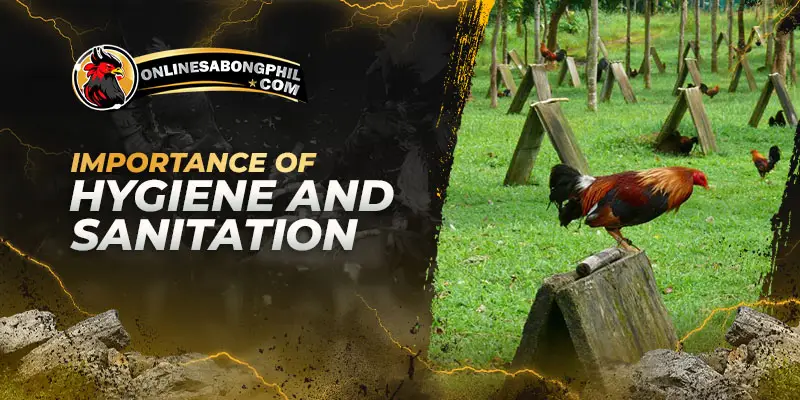Coccidiosis, a disease caused by the invasion of coccidia parasites within the intestinal tract, poses a significant threat to the health and performance of gamefowl. This guide delves deep into understanding gamefowl coccidiosis, its implications, and strategies for effective management and prevention.
What Is Coccidiosis?
Coccidiosis is a severe parasitic disease in gamefowl caused by protozoa of the genus Eimeria. These parasites live in the rooster’s intestines and cause damage that can lead to significant health concerns and even death.
Symptoms
- Diarrhea (often bloody or containing mucus)
- Loss of appetite
- Weight loss
- Lethargy
- Ruffled feathers
- Dehydration
Transmission
Gamefowl become infected when they ingest contaminated feed, water, or bedding. Oocysts (the microscopic egg stage of the parasite) are shed in the feces of infected roosters.
Risk Factors
- Overcrowding
- Poor sanitation
- Stress
- Inadequate nutrition
Prevention and Management
- Cleanliness and sanitation: Regularly clean and disinfect coops and equipment.
- Preventive medication: Coccidiostats are added to feed or water to help prevent the disease. Amprolium is a typical example.
- Reduce stress: Provide adequate space, clean environments, and proper nutrition.
- Isolate infected roosters: Quickly separate roosters showing symptoms to prevent the spread to others.
Treatment
While prevention is critical, there are treatment options for roosters with coccidiosis. Veterinarians often prescribe the following:
- Sulfa drugs (Sulfonamides): These antibiotics target the coccidia parasites.
- Amprolium: A medication that interferes with the parasite’s reproduction.
Important Considerations
- Consult a veterinarian: Proper diagnosis and treatment guidance are critical. Many gamefowl medications are regulated due to concerns about residues in roosters meant for human consumption.
- Drug Resistance: Long-term use of the same medications can lead to resistant parasite strains.
- Hygiene: Strict hygiene practices remain essential even when utilizing medications for prevention or treatment.
Coccidiosis poses a severe threat to gamefowl health. You can protect your rooster by understanding the disease, implementing preventive measures, and seeking prompt veterinary treatment.
Importance of Hygiene and Sanitation
Keeping things super clean is vital to stopping coccidiosis in your gamefowl. Wash and disinfect their houses, feeders, and water containers often to eliminate nasty parasite eggs. Use lime to dry out damp floors, making it harder for the parasites to survive. Change dirty bedding, clean up poop regularly, and make sure there’s good airflow in their houses. These simple steps will make it much harder for your rooster to get sick.
Dietary Management and Nutrition
A well-balanced diet fortified with essential nutrients can enhance gamefowl’s resilience against coccidiosis. Ensuring access to clean water is crucial in maintaining health and disease resistance.
- A Strong Foundation: Like humans, a balanced diet is essential for gamefowl to maintain a robust immune system. Provide a high-quality feed formulated to meet their nutritional needs. This strengthens their natural defenses against parasites like coccidia.
- Preventative Supplements: Consider adding amprolium to your rooster feed. This medication helps interfere with the coccidia parasite’s life cycle, reducing the risk of infection. Probiotics, or “good bacteria,” can also promote gut health and make it harder for harmful parasites to take hold.
- The Importance of Hydration: Clean water is vital for all bodily functions, including the immune system. Ensure your gamefowl have constant access to clean water to support their health and resilience against coccidiosis.
Vaccination and Medication
Vaccination is a proactive approach to disease management. Though not a one-size-fits-all solution, it can be a practical part of an integrated management plan. Anticoccidial medications are available but should be used judiciously to avoid resistance. Rotate between different classes of drugs to maintain their effectiveness and consult with a veterinarian to establish an appropriate prevention program.
Common Challenges and Solutions
Here’s a breakdown of typical challenges faced in managing gamefowl coccidiosis, along with potential solutions:
Common Challenges
- Early Detection: Coccidiosis symptoms can be subtle initially and mimic other illnesses, delaying diagnosis and treatment.
- Drug Resistance: Over Reliance on the same anticoccidial medications can result in resistant parasite strains, making treatment less effective.
- Maintaining Hygiene: Ensuring strict hygiene in pens, feeders, and waterers takes ongoing effort, especially in large flocks.
- Reinfection: Even after treatment, roosters can become reinfected if hygiene isn’t consistently maintained.
Potential Solutions
- Observation and Awareness: Closely monitor your rooster for signs of illness (lethargy, diarrhea, loss of appetite, etc.). Educate yourself on the full range of coccidiosis symptoms for early recognition.
- Strategic Medication Use: Work with your veterinarian to rotate between different classes of anticoccidial drugs. This helps prevent resistance buildup.
- Hygienic Habits: Develop a regular cleaning and disinfection schedule for all equipment and housing. Pay attention to moist areas and remove droppings promptly.
- Post-Treatment Hygiene: After a coccidiosis outbreak, extra vigilance is necessary. Thoroughly clean and disinfect the environment to minimize the risk of reinfection.
- Prevention Mindset: Prioritize balanced nutrition, minimize overcrowding, and consider using preventative feed additives like amprolium to decrease the risk of infection from the start.
Remember:
Seeking veterinary guidance is critical for effective treatment and building a sustainable prevention program for your flock.
Conclusion
Gamefowl coccidiosis is a manageable condition with the proper knowledge and tools. By understanding the disease, implementing preventative measures, and acting swiftly at the first sign of an outbreak, you can maintain a healthy and thriving flock.
Visit us at onlinesabongphil.com for more guides and tips!


